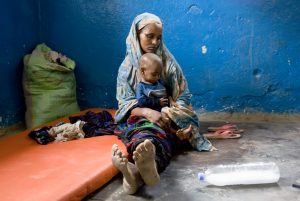

Your browser is not up to date.
If you wish to view the Action Against Hunger website correctly, update your browser.
Find the latest versions of supported browsers listed below.
No matching results…
No results seem to match what you are looking for, please modify your search.
 @ Action contre la Faim
@ Action contre la Faim
Headline
This approach is helpful for mothers like Makaay Mohamed Keyr, who has five children and cannot travel often to the nearest health center in Hudur town. When she and the other mothers in her community do make it to the health center, the journey is not easy or safe – it takes at least an hour of walking under the blazing sun and through dangerous forests.
This fall, Makaay’s youngest son developed very high fever and constant diarrhea. His condition worsened by the hour. With the help of a community health worker based in their village, the little boy went through health screening and was diagnosed with diarrhea, which can lead to malnutrition and sometimes prove fatal in very young children. He was treated with oral rehydration salts and, after a few hours, his health began to improve. The health worker responsible for Makaay’s son continues to follow up, visiting often to check in on his recovery.
Two of Makaay’s children live with albinism, which carries a stigma in the community. As a result, they’ve been bullied. Makaay is grateful for the support she receives from community health workers, who visit her home and that of her neighbors to perform regular health check-ups.


“We have access to community health workers, who have been of much help, as they can diagnose various illnesses and treat some of them at your doorstep,” she says. “My heartfelt thanks go to them. They regularly do door to door visits serving the village children. When the children fall ill, they give them treatment, or they refer us to the hospital when the situation is beyond their capacities.”
Community health workers play a key role in helping families access health services – so, too, does direct community outreach. For marginalized communities – those kept out of traditional life – building trust through community engagement goes a long way.
Near Makaay’s village, one such marginalized community lives on the edge. The Eylo people – named for their practice of hunting with dogs – are stigmatized and looked down upon by the rest of the community because of how they hunt. On the outskirts of society, the Eylo community has not felt accepted or safe in markets, health centers, and other public places.
Action Against Hunger’s team, using the People’s First Impact Methodology approach, has begun outreach to the Eylo community. Two Eylo women and three Eylo men were invited to participate, discuss, and interact with a neighboring “mainstream” community and to provide input on the development of a community action plan.
This was no easy feat: our staff faced challenges and resistance from the majority of community members, who said they felt uncomfortable around the Eylo members of the group. Action Against Hunger’s team did not give up – we held meetings with local authorities, community resilience committees, and community elders to advocate for the inclusion of the Eylo people.
This process gave the Eylo people a platform to speak and be heard by their fellow community members, to take part in community initiatives, and to access community services, including healthcare. To further foster good will and cooperation, with the help of the community resilience committees, we established a taskforce for conflict resolution and integration of the Eylo community.
"With the help of the local authorities and staff at Action Against Hunger, we are slowly reintegrating into the community."

Action Against Hunger currently supports 126 Eylo families with health, nutrition, water, sanitation, food security, and livelihoods programs, and soon they will take part in our resilience projects as well.
The People’s First Impact Methodology has been a key driving force for Action Against Hunger’s team to capture the voices of marginalized groups. For the Eylo in Hudur, it has helped to create a starting point to be counted equally and to take part in programs to improve their lives.
Somalia
All the news of our Action: articles, events, testimonials, press releases…